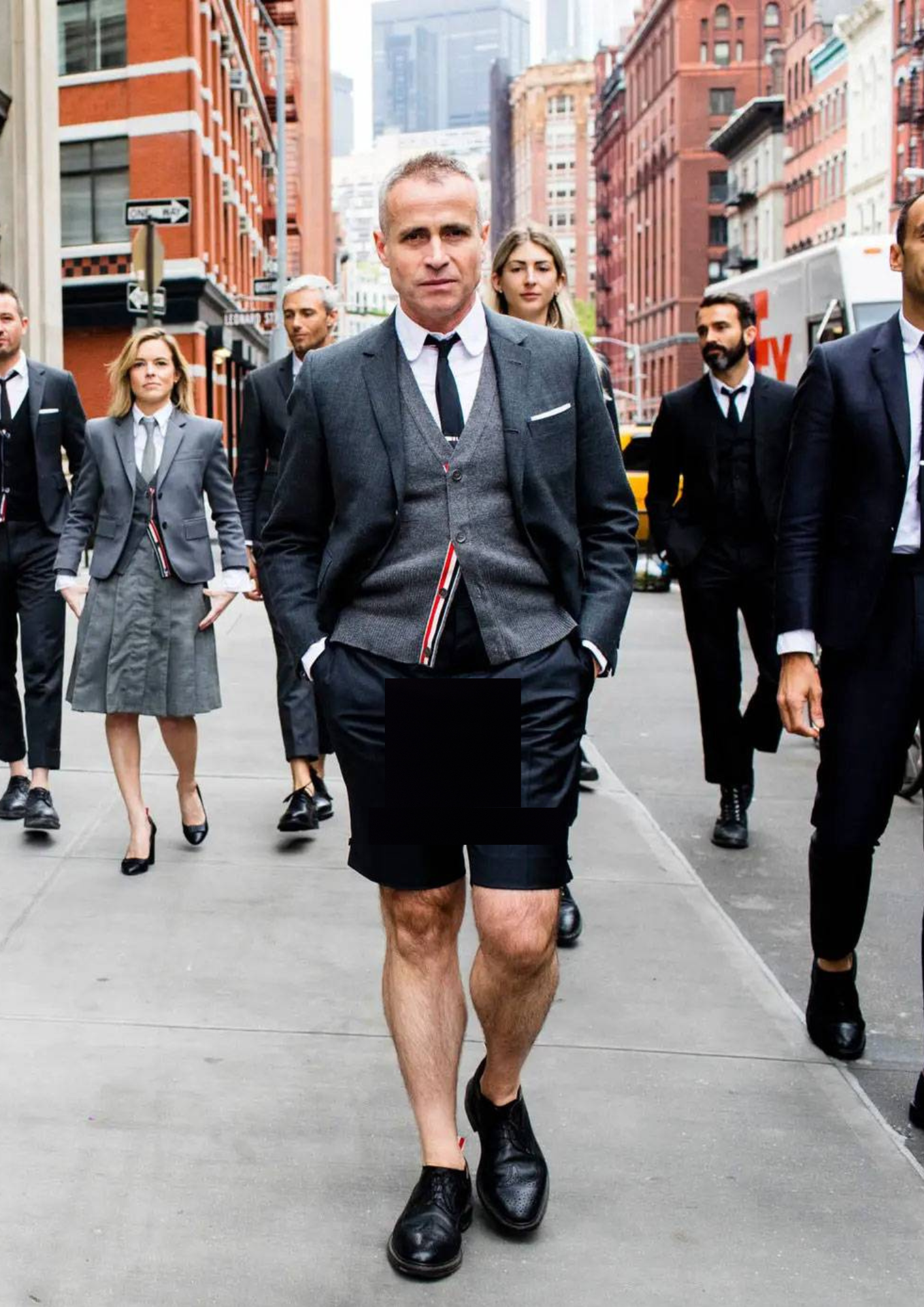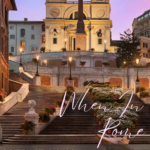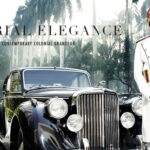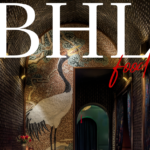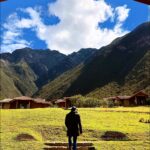by Frank Meli
On her: LeJolie.com dress, MAKKO spike earrings, Kesha Rose by Charles Albert rings, Luichiny boots
On him: Jacob Davis leather jacket, Gap Jeans
“I’m here to see the band ME&U.”
A couple of steps through the main entrance of Swinghouse Studios in Los Angeles, a rock ‘n roll bluesy guitar riff, reminiscent of the late great Jimi Hendrix, rips through the speakers, while a Joplin-like powerhouse voice weaves in and out. It’s ME&U just warming up. Composing and performing together for the past six years at some of the most famous venues in the country, guitarist Nazim Chambi, and vocalist Andrea Meli are rehearsing one of their original compositions, Break Me, which makes its debut in the soon-to-be-released movie, Dragula. Music blogs are calling this rock ‘n roll duo electrifying, and a must-see live act. Let me tell ‘ya, seeing is believing.
In between rehearsal sets, Beverly Hills Lifestyle Magazine eavesdropped on an interview the vocalist’s brother, Dragula Film Director Frank L. Meli, was conducting, as the two musicians stepped off the stage, and let it all out.
Frank: First of all, I want to tell you, I’m a big fan of your music.
ME&U: Thank you.
Frank: You guys are from two different worlds—Andrea you’re a vocalist from Michigan, and Nazim, you’re a guitar player from Africa. How does that influence your music?
Andrea: I grew up right outside of Motown, and worked with some incredible people. In Motown, it’s rhythm and blues; and it’s real, it’s raw. I remember being invited to Harmonie Park Studios in Detroit to work with Roquel Payton, one of the Four Tops. He had heard my voice, but had never seen me. When he came out to greet me in the front lobby, he was shocked, and said he could have sworn that I was an older black woman by the sound of my singing voice. He brought me up to the studio, and said to me, ‘Before we get started, I need you to understand that you’re in Motown, and we sing about real things. So, if you have any idea of singing this bubble gum pop, you can leave now; but if you’re ready to really express your deep emotions, then we’re going to have a good time.’ I brought this mentality with me to Los Angeles. The first time I saw Nazim perform, I saw that in him, and I knew we were born to play together.
Nazim: We have different influences. I bring my style, and she brings hers. It meshes. I’m from Algeria, and the music is very rhythmic. The pentatonic scale, which was born in Africa, inspired blues, and rock and roll, everything we hear now. A perfect example is when we wrote our song, Epic, which is one of my favorite cord progressions. I started playing the song, and Andrea started singing over it, and I thought, ‘Okay, this is going to be the band I’m in.’ Epic is still our strongest song. It’s so powerful. When we hire drummers and base players, and we play that song, you should see the looks on their faces. Their eyes are popping out of their heads, they’re sweating, they’re in the moment.
Frank: Okay, let’s start from the beginning. Andrea?
Andrea: How far?
Frank: Far.
Andrea & Nazim: (laughing)
Nazim: Okay, great. Let’s do this.
Frank: Andrea, as a child, I have a lot of memories visiting you in the hospital because of your asthma, running around your hospital room, stealing your frozen sorbet . . .
Andrea: Aha! I knew it was you.
Frank: . . . tripping over your IV. Does your asthma affect your voice today?
Andrea: I can’t believe you stole a sick child’s frozen sorbet. You owe me big time.
Frank: Just answer the question, Andrea.
Andrea: Yes, Frank, my asthma does affect my voice. It gives me a raspy sound that has actually come to define and identify me as a singer.
Frank: When we were like seven years old, you used to hit very high notes singing Phantom Of The Opera. Do you incorporate those into your music?
Andrea: Oh my gosh, so funny. Yes, yes, anytime I can get away with it.
Frank: What was your aha moment when you realized you wanted to be a performer? I mean, growing up in Grosse Pointe, Michigan, where most of our childhood friends still live, isn’t exactly a haven for alternative lifestyles.
Andrea: Yeah, it’s pretty conservative, but there’s nothing normal about either one of us, Frankie. Do you remember when we were little, we’d create musicals in the garage, and our own movies, haunted houses, and music videos? You and I were so creative, and we’d feed off each other. We’re still doing that today. I felt like I had more emotions than a lot of kids in our neighborhood, always felt a little out of place. On some level, I knew that music was in my blood at that point, because singing was how I would escape.
Frank: In middle school, you ran with the wrong crowd, and were sent to a boarding school in Colorado. Did you put your music on hold?
Andrea: First of all, I don’t think it was the wrong crowd.
Frank: Exactly!
Andrea: Haha. Very funny. I used to skip class to go play music in my friend’s basement. His dad had a drum set. I never put my music on hold. In Crested Butte, I actually collaborated and sang on a track that played in the credits of a ski movie called, High Society, by Matchstick Productions. I always kept singing and writing.
Frank: …but you had started a snowboarding career, and you were in the exhibition games at the 2002 Salt Lake City Olympics, then you quit and turned back to music. Why?
Andrea: The reason I started snowboarding in first place is that I wanted to prove to myself that I could do something women weren’t supposed to do. After I got into it, I wanted to inspire other people to go for something that seemed unreachable. I quit, because I just felt like I was done. In all reality, though, that was when Vince died (Andrea and Frank’s older brother), and that changed all of us, as you know. I knew I had to get more responsible. I didn’t want my family worrying about me all the time.
Frank: Nazim, when did you and your family move here from North Africa?
Nazim: I was 10 years old when I unexpectedly moved to the U.S. from Algeria.
A couple of steps through the main entrance of Swinghouse Studios in Los Angeles, a rock ‘n roll bluesy guitar riff, reminiscent of the late great Jimi Hendrix, rips through the speakers, while a Joplin-like powerhouse voice weaves in and out. It’s ME&U just warming up. Composing and performing together for the past six years at some of the most famous venues in the country, guitarist Nazim Chambi, and vocalist Andrea Meli are rehearsing one of their original compositions, Break Me, which makes its debut in the soon-to-be-released movie, Dragula. Music blogs are calling this rock ‘n roll duo electrifying, and a must-see live act. Let me tell ‘ya, seeing is believing.
In between rehearsal sets, Beverly Hills Lifestyle Magazine eavesdropped on an interview the vocalist’s brother, Dragula Film Director Frank L. Meli, was conducting, as the two musicians stepped off the stage, and let it all out.
Frank: First of all, I want to tell you, I’m a big fan of your music.
ME&U: Thank you.
Frank: You guys are from two different worlds—Andrea you’re a vocalist from Michigan, and Nazim, you’re a guitar player from Africa. How does that influence your music?
Andrea: I grew up right outside of Motown, and worked with some incredible people. In Motown, it’s rhythm and blues; and it’s real, it’s raw. I remember being invited to Harmonie Park Studios in Detroit to work with Roquel Payton, one of the Four Tops. He had heard my voice, but had never seen me. When he came out to greet me in the front lobby, he was shocked, and said he could have sworn that I was an older black woman by the sound of my singing voice. He brought me up to the studio, and said to me, ‘Before we get started, I need you to understand that you’re in Motown, and we sing about real things. So, if you have any idea of singing this bubble gum pop, you can leave now; but if you’re ready to really express your deep emotions, then we’re going to have a good time.’ I brought this mentality with me to Los Angeles. The first time I saw Nazim perform, I saw that in him, and I knew we were born to play together.
Nazim: We have different influences. I bring my style, and she brings hers. It meshes. I’m from Algeria, and the music is very rhythmic. The pentatonic scale, which was born in Africa, inspired blues, and rock and roll, everything we hear now. A perfect example is when we wrote our song, Epic, which is one of my favorite cord progressions. I started playing the song, and Andrea started singing over it, and I thought, ‘Okay, this is going to be the band I’m in.’ Epic is still our strongest song. It’s so powerful. When we hire drummers and base players, and we play that song, you should see the looks on their faces. Their eyes are popping out of their heads, they’re sweating, they’re in the moment.
Frank: Okay, let’s start from the beginning. Andrea?
Andrea: How far?
Frank: Far.
Andrea & Nazim: (laughing)
Nazim: Okay, great. Let’s do this.
Frank: Andrea, as a child, I have a lot of memories visiting you in the hospital because of your asthma, running around your hospital room, stealing your frozen sorbet . . .
Andrea: Aha! I knew it was you.
Frank: . . . tripping over your IV. Does your asthma affect your voice today?
Andrea: I can’t believe you stole a sick child’s frozen sorbet. You owe me big time.
Frank: Just answer the question, Andrea.
Andrea: Yes, Frank, my asthma does affect my voice. It gives me a raspy sound that has actually come to define and identify me as a singer.
Frank: When we were like seven years old, you used to hit very high notes singing Phantom Of The Opera. Do you incorporate those into your music?
Andrea: Oh my gosh, so funny. Yes, yes, anytime I can get away with it.
Frank: What was your aha moment when you realized you wanted to be a performer? I mean, growing up in Grosse Pointe, Michigan, where most of our childhood friends still live, isn’t exactly a haven for alternative lifestyles.
Andrea: Yeah, it’s pretty conservative, but there’s nothing normal about either one of us, Frankie. Do you remember when we were little, we’d create musicals in the garage, and our own movies, haunted houses, and music videos? You and I were so creative, and we’d feed off each other. We’re still doing that today. I felt like I had more emotions than a lot of kids in our neighborhood, always felt a little out of place. On some level, I knew that music was in my blood at that point, because singing was how I would escape.
Frank: In middle school, you ran with the wrong crowd, and were sent to a boarding school in Colorado. Did you put your music on hold?
Andrea: First of all, I don’t think it was the wrong crowd.
Frank: Exactly!
Andrea: Haha. Very funny. I used to skip class to go play music in my friend’s basement. His dad had a drum set. I never put my music on hold. In Crested Butte, I actually collaborated and sang on a track that played in the credits of a ski movie called, High Society, by Matchstick Productions. I always kept singing and writing.
Frank: …but you had started a snowboarding career, and you were in the exhibition games at the 2002 Salt Lake City Olympics, then you quit and turned back to music. Why?
Andrea: The reason I started snowboarding in first place is that I wanted to prove to myself that I could do something women weren’t supposed to do. After I got into it, I wanted to inspire other people to go for something that seemed unreachable. I quit, because I just felt like I was done. In all reality, though, that was when Vince died (Andrea and Frank’s older brother), and that changed all of us, as you know. I knew I had to get more responsible. I didn’t want my family worrying about me all the time.
Frank: Nazim, when did you and your family move here from North Africa?
Nazim: I was 10 years old when I unexpectedly moved to the U.S. from Algeria.
Frank: Unexpectedly?
Nazim: Yeah, because during the ‘90s, there was terrorism in Algeria, so my parents decided to move us out. They told me I was going to California on vacation, but the reality was, they were getting us out, because they were receiving threats from the terrorists. So, me and my brother each literally packed one suitcase, and didn’t say goodbye to anyone. It was shocking, yet exciting. It was a dream come true to move to the states. My parents followed around six months later.
Frank: Did the terrorist bombings in Algeria have an effect on you?
Nazim: Yes, as a kid I was extremely traumatized. It got to a point where I was afraid to go anywhere. The terrorists would plant bombs everywhere, even in schools. One time, there was a red object under a platform that my teacher would stand on in front of class, and we all ran out thinking it was a bomb.
Frank: Do you have any good memories about your childhood in Algeria?
Nazim: I loved playing soccer in the neighborhood, and going to my grandparents’ house every Thursday. In the summers, we’d all go to Béjaïa on the Mediterranean Sea. We’d sleep in the mountains, and the beaches were below, where we’d spend our days.
Frank: Andrea, shortly after I moved out to Los Angeles, you followed. Why was that?
Andrea: Because both my brothers were there, and we’re supposed to do life together, not alone, not apart.
Frank: What brought you to LA?
Nazim: I was dissatisfied with my life in the bay area, musically speaking, and I was trying to find an out. I found out about Musician’s Institute, and I thought, perfect, it would be a good chapter in my music career.
Frank: Nazim, you’re an incredible guitarist. When was the first time you picked up a guitar?
Nazim: It was my uncle’s guitar, but I didn’t know what I was doing. I picked it up and played it upside down. I bought my first guitar for $20 bucks when I was 16 years old. My friend, Alex, gave me the $20, and I gave him my skateboarding sweatshirt.
Frankie: Ok, did you have a role model, an inspiration in the music world?
Nazim: Oh man, that’s a tough one. I’d say there are two. Yngwie Malmsteen, and then, of course, Jimi Hendrix. Yngwie is a virtuoso guitarist. Hendrix inspired me performance wise. He felt the music. It awakened a certain confidence in me. He made me realize I have that same passion.
Frank: It’s a lot of work to run a band? Do you have a business manager or agent?
Andrea: No, I handle the entire business side of the band. It’s challenging, but it’s all driven by passion. I feel like I haven’t slowed down in six years.
Frank: Tell me something strange about yourselves that people might never know. Nazim: Chickens freak me out (laughing).
Frank: Haha, chickens?
Nazim: These were no ordinary chickens, Frank. I was six or seven years old, and we’d go to my uncle’s farm in the Berber area in Algeria. These f__ing chickens terrorized me. They were crazy, I mean, they were carnivorous chickens. I would go and play, and they would chase and attack me.
Frank: So, Andrea, do chickens freak you out, too?
Andrea: Probably, but, really, there are two things. First, I used to sneak through a crack in the fence at Meadow Brook Theatre in Rochester Hills, Michigan, and stand on the outdoor stage in front of hundreds of empty chairs, and sing for hours. When I closed my eyes, I felt like the seats were full. I’d open my eyes back up again, sit on the stage and start to cry. Secondly, ME&U’s first performance was at a Mexican gay bar, where only four people showed up.
Frank: (laughing) I know, because I was one of the four people there. What did you learn from those experiences, Andrea?
Andrea: That you have to perform for yourself. I don’t care if there are zero people or 40,000 in the audience. Oh, and that I have a very supportive brother.
Frank: Andrea, there are many forms of addiction. You experienced one. Shortly after that, you enrolled in music school. Care to elaborate?
Andrea: It was about control. I felt so lost, numb, and out of control, especially after we lost Vince. I went to rehab for my eating disorder. I had a lot of time to think and meditate. The answer to me was to bring myself back to my heart, and my heart told me I have to play music, live music, and through music help people feel those deep emotions that we all sometimes numb out.
Frank: I understand all musicians hate labeling, but it’s a way to identify your music. What’s your label?
Andrea: Our label? (Andrea looks at Nazim and Frank.) I’m ME, and you guys are U.
Nazim: No, I’m ME, and you guys are U.
(Everyone laughs. Frank rolls his eyes.)
Andrea: It just depends on how you look at yourself in the mirror. (Andrea winks.)
ME&U: but seriously, if you’re going to label us, we’re a rock band. Rock is rock, but people always ask us what kind of rock. So, we came up with the term ‘Royal Rock,’ because we were so sick of that question. Royal brings with it a certain feeling, you know, like a classical baroque, mixed with ‘60s, ‘70s, ‘80s, ‘90s rock, which has a lot of blues influences. We’re open to every single genre of music, but we still maintain a modern rock vibe.
Frank: So, why you two, why ME&U?
Nazim: We met in music school. First week of school, I played a concert, and Andrea approached me. She needed a guitar player. I wasn’t sure. I knew I wanted to create a sound, but didn’t know how. I said maybe. Our second encounter, Andrea said she had a song called, Fuck Christmas, and asked me to play on it. Our third encounter, my friend, Crane, told me he was in a band that was kind of like Jethro Tull with a girl singer. I showed up at rehearsal, and Andrea was the singer. She was everywhere. I thought she was a triplet with two other sisters. We played a song called Creep, by Radiohead. As soon as the song was done, and I opened my eyes, I was on my knees playing guitar, and she was on her knees singing, and every one else was looking at us like, ‘What the hell?’ That is when we decided we were going to start a band. That was how this madness started.
Andrea: Yeah, that pretty much sums it up. We don’t have a choice, though. I really believe it was meant to be, that’s it. We were brought together, predestined, kind of chosen to play this music. We’re just the hosts. And it will always be, until it’s not supposed to be.
Frank: What’s the future of ME&U?
Andrea: We’re currently releasing our new music video, WHO, that you directed, Frankie, and we’re in the studio working on some new material. Right now we’re self-funded, self-managed, and we write all of our own songs. We love doing everything by ourselves, but could use a little help. It’s hard to see into the future, but we really want to continue touring, writing music, and finding ways to reach more people.
Nazim: Touring, world tours, more music, more recorded music, hopefully multiple albums, a Grammy, those kinds of things.
Frank: What do you want on your tombstone?
Andrea: Pineapples and jalapeños.
Nazim: I guess I would want a guitar with wings drawn on it, like angel wings. Frankie, what’s up with this question? I lived to inspire, create, love. I’m trying to visualize a tombstone. Okay, here: “I told you I could do it.”





